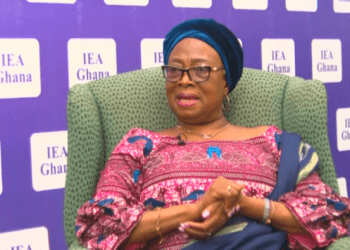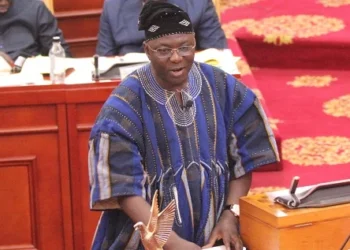In recent times, having recognized the overwhelming burden of posing as developmental agents, Members of Parliament have taken any slightest opportunity to educate their constituents about their core mandate as lawmakers.
However, the situation looks sharply contrasting in the Chambers where laws are made.
Following the repeal of some sections of the Companies Act 2019 (ACT 992), even though Parliament has generally accepted it erred and the seeming deepening of democracy, Parliamentarians seem not to take the core of their mandate seriously enough in Ghana.
Parliament is clothed with the legislative mandate of government as a functional end. For all its roles and features; representation, and oversight among others, legislation is the reason for such prime instrumental roles.
However, Parliamentarians seem to relegate the core duty to other peripherals at the slightest.
“When it comes to passing bills, only a few of us are seen in the chamber or actively contributing to it. I plead that going forward we all come together to prevent such reoccurrence. During such times, we almost have an empty house.”
Adwoa Sarfo, former Deputy Majority Leader
Her views were corroborated by the former Minority Leader, Haruna Iddrisu and the first Deputy Speaker of Parliament.
Ironically though, the call for some measure of superiority to be attached to that very role came from the Member who abandoned the House for over a year.

According to her, most members relinquish the role to the few who are supposedly masters of the law, a pitying situation for Ghana. Then why did one go to parliament? Should you be lacking the nitty gritty of the cumbersome process, would the title Honorable not require you to submit to learning the rudiments thereof?
At the heart of this imperative lies the understanding that legislation is not merely a procedural requirement but a powerful tool for societal transformation. Laws enacted by Parliament serve as the foundation upon which a just, equitable, and thriving society is built. From economic policies to social justice issues, the impact of legislation reverberates through every aspect of Ghanaian life.
One fundamental aspect that demands the utmost attention is the economy. Ghana’s economic trajectory is intricately linked to the legislative decisions made within the hallowed halls of Parliament. From budget approvals to economic reforms, each legislative action influences the nation’s fiscal health. Hence, parliamentarians must engage deeply with economic matters, ensuring that legislation is not only robust but also reflective of the needs and aspirations of the Ghanaian people.
Similarly, social issues ranging from education and healthcare to human rights and gender equality require meticulous legislative attention. In a country where the population’s well-being hinges on the effectiveness of social policies, parliamentarians must champion laws that uplift communities, promote inclusivity, and safeguard the rights of every citizen.
The urgency to prioritize legislation is underscored by the need for legal frameworks that address contemporary challenges. Climate change, technology, and global health crises demand agile legislative responses. Parliamentarians must exhibit foresight and diligence in crafting laws that equip Ghana to navigate the complexities of the modern world while ensuring the protection of its citizens and the preservation of the environment.
However, the parliament deserves approbation for its oversight duties which have heightened through its regular invitations of government officials to the House to answer questions of public interest. Even the most well-crafted laws become ineffectual if not implemented with diligence. Hence, parliamentarians must continue to go beyond the act of passing legislation and actively engage in oversight to ensure that the laws they promulgate are executed efficiently.
In this context, the Parliament of Ghana should refrain from being rushed into passing laws; it must own the process entirely.
Moreover, public engagement and transparency in the legislative process are vital components of a thriving democracy. Parliamentarians must actively seek and incorporate public input from their constituents in the legislative process. By fostering transparency, they can enhance public trust in the democratic system and ensure that laws genuinely reflect the will of the people.

The call for parliamentarians to take legislation more seriously is not a critique of their dedication but a recognition of the profound influence they wield. The decisions made within the chambers of Parliament shape the nation’s trajectory, impacting the lives of millions. Therefore, parliamentarians must view legislation not as a routine task but as a solemn duty, a commitment to sculpting a future where justice, equality, and prosperity prevail.
The imperative for Ghana’s parliamentarians to prioritize legislation is rooted in the recognition of its transformative power. By approaching legislative responsibilities with diligence, foresight, and a commitment to public welfare, parliamentarians can contribute significantly to the nation’s development.
Thus, it will be encouraged that disciplinary actions as postulated by the 1992 Constitution and the Standing Orders of Parliament are taken against any Member of Parliament who derelicts this all-important role habitually.
Also, Ghanaians would like to see Parliamentarians vote on bills publicly to increase representative accountability to the constituents. Moreover, a daily roll call should proceed all sittings. Constituents will like to know if their representative is in the chamber.
Acknowledged, Parliamentarians have other duties but the argument remains that of all their roles, this is supreme and can therefore not be relegated so habitually. This adds another layer in favour of the school of thought that the executive should be total separated from the legislature (i.e. no minister should be a parliamentarian). This will relieve them of other duties and focus on their job. As the guardians of Ghana’s democratic ideals, they hold the key to unlocking the full potential of the nation and steering it toward a future marked by progress and prosperity for all.
READ ALSO: Three Years On; Rawlings’ Legacy “Raped”





















